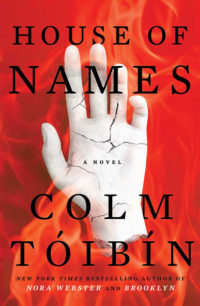Our words are trapped in time
 House of Names
House of Names
by Colm Tóibín
I’ve been meaning to read more Tóibín since I enjoyed his book Brooklyn last year, so I was excited to spot his latest novel on NetGalley. It’s a retelling of the Ancient Greek myth of Clytemnestra, which I only loosely knew beforehand. Luckily an epigraph sketches it out, so that you start the book knowing how the story will pan out.
In common with some other myth retellings I’ve read, I initially found the language stilted, keeping me at a distance, but I gradually stopped noticing the old-fashioned style and instead enjoyed the beauty of the language. In the story, Tóibín has managed to be much less old-fashioned, primarily by telling much of it from the women’s perspectives. The opening section is narrated by Clytemnestra. Later her younger daughter Electra picks up the narration. But when Electra’s brother Orestes’ story is told it’s from a third-person perspective.
“I went out and looked at the sky. And all I had then to help me was the leftover language of prayer. What had once been powerful and added meaning to everything was now desolate, strange, with its own sad, brittle power, with its memory, locked in its rhythms, of a vivid past when our words rose up and found completion. Now our words are trapped in time, they are filled with limits, they are mere distractions; they are as fleeting and monotonous as breath. They keep us alive, and maybe that is something, at least for the moment, for which we should be grateful.”
The story itself is very melodramatic. It opens with Clytemnestra discussing the dead bodies lying outside of her husband Agamemnon and his lover Cassandra. So when she goes back and tells the story leading up to the double murder, the endpoint is no surprise. But the real fun begins after that, with the aftermath.
The reason it gets interesting there is the emotional responses to the melodrama, which are more subtle in Clytemnestra’s children than in her. But it also gets more devious; there are games afoot. Once I got into the style I thoroughly enjoyed this.
Published May 2017 by Scribner.
Source: An advance copy was kindly supplied by the publisher via NetGalley.
I haven’t heard of this book before. It sounds interesting.